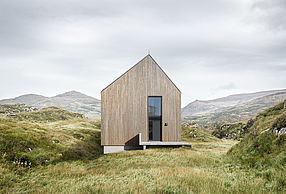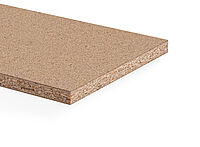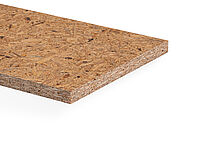Advantages of Pfleiderer LivingBoard compared to standard OSB
Like standard OSB boards, LivingBoard from Pfleiderer is made of wood chips and other natural wood by-products. However, what makes LivingBoard special in the first place is its optimised chip geometry.
Higher flexural strength, lower thickness swelling
With normal OSB boards, the bending strength across the direction of manufacture is significantly lower. LivingBoard, on the other hand, has an almost equally high bending strength in all directions. This means that the boards cannot be used statically incorrectly by mistake. Since the processing direction does not have to be observed, the processor also has an optimal waste and a higher board yield.
Another product advantage compared to standard OSB: the thickness swelling is significantly lower. This is also due to the optimised chip geometry, but also to the moisture-resistant PU joint.
Better airborne sound insulation and lower burn rate
LivingBoard products from Pfleiderer have a particularly high raw density - and this is homogeneous throughout the entire board. The result is better airborne sound insulation, which means decisive quality advantages in interior finishing for walls, ceilings and floors. In addition, the high, uniform density ensures a lower burn rate and thus offers more safety in case of fire.
Healthier and more ecological than normal coarse chipboards
Last but not least, LivingBoard is the significantly more home-healthy coarse chipboard. Since it is made almost exclusively from low-resin spruce, the VOC emissions meet the strict requirements of the AgBB scheme. Normal OSB boards, on the other hand, are usually made of resin-rich pine and therefore have higher emissions. In addition, the binder in our boards is formaldehyde-free, which means that LivingBoard products are significantly below the emission requirements according to EN 13986 (E1) and meet those of the "Blue Angel" eco-label. LivingBoard thus guarantees high indoor air quality.
Our chipboards are also healthy for the environment. Instead of using unchipped forest wood, we at Pfleiderer use sawmill by-products such as chips, slabs and splinters as well as thinned wood (broken wood, beetle wood and cross-cut pieces) from PEFC or FSC® certified forests. This means that no additional trees have to be felled for LivingBoard boards. The Cradle to Cradle CertifiedTM Silver label additionally confirms the distinct environmental friendliness.

Standard OSB panels and LivingBoard in comparison
Formaldehyde emissions in ppm
LivingBoard is manufactured with a 100% formaldehyde-free binder. As a result, the formaldehyde emission of LivingBoard is comparable to that of natural wood. LivingBoard is significantly below the emission requirements of EN 13986 (E1) and meets those of the "Blue Angel" eco-label.
The formaldehyde emissions of LivingBoard are 40% lower than the German E1/E05.
Flexural strength transverse to the direction of manufacture in N/mm2
(Thickness: 12 mm)
High flexural strength in all board directions guarantees the processor a high board yield, optimum offcut and prevents incorrect "static use".
The flexural strength of standard OSB boards is significantly lower transverse to the direction of manufacture, whereas the flexural strength of LivingBoard is consistently high in all board directions. Across the direction of manufacture, it is even 80% higher.
Thickness swelling in %
(Thickness: 15mm)
Due to the moisture-resistant PU joint and the optimized chip geometry, LivingBoard has a significantly lower thickness swelling than standard OSB. The thickness swelling of LivingBoard P5 is 33% lower than OSB/3 according to EN 300.
Burning rate / burning speed in mm/min
(Thickness: 12 mm)
LivingBoard has an 8% lower burn rate than a standard OSB board due to its homogeneous structure and uniformly high bulk density, thus offering more safety in case of fire.


